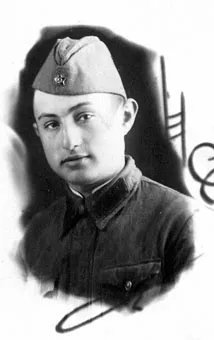I, Rondin Sholom, in the Red army. Photo made in Murmansk in 1940 and sent to my wife and son.
At the end of 1939 my wife gave me a son. We named him Gennadiy - it was a popular name at that time.
In 1940 I was recruited to the army. They ignored that I was a breadwinner in my family and that my wife had a baby. It was possible to pull some strings to avoid going to the army, but I am not the type of person to get involved into such dealing and wheeling. A law is a law.
I was sent to the field-engineering unit in the town of Murmansk in 3500 km from Gomel. There were fortifications built on the bank of the bay in the vicinity of Poliarniy town. Our unit stayed in Murmansk to unload trains. I know what a polar night is, I saw the Northern lights and discovered the beauty and grandeur of the North. I was lucky to stay in the town. I also worked at the Red army cultural center painting decorations for the stage. I had an opportunity to watch performances. People treated us with respect. My fellow comrades called me Shlyoma and in my documents my name was written as Shlomo. I never changed my name while many other Jews changed their Jewish names to Russian ones. They pretended they did it to make communication easier, but in reality they did it to hide their Jewish nationality. Our commanding officer was a Jew and many soldiers were Jews and there was no anti-Semitism whatsoever. I never heard a bad word in my address. My service term was to last 1 year and 8 months instead of standard two years due to hardships of the North and I was looking forward to demobilization. We didn't even think about the war. On 22 June 1941 I was a sentry on guard of a gasoline tank. My shift was 2 to 6 am. Around 4 o'clock in the morning (the sun rises early there and I saw it all) I saw planes flying low in 3 rows. I was enjoying the sight when they began dropping bombs and I understood what it was about. Our service lasted 6 years instead of 1 year and 8 months.
The war at the Kola Peninsula was cruel. We were holding defense of Murmansk. We were fighting side by side and paid no attention to nationality issues. We had to stand for one another or we wouldn't have survived. I was awarded a medal "For Courage", the first one in our battalion. We were to destroy tanks of the enemy. We crawled across battlefield under fire from both sides. Many combat engineers perished on those days. There were many Jews among mine layers, because the commandment knew that Jews were smart and cautious.
During the war when Stalin was at the head of the state everything was well organized. Soldiers were well fed in the North. They had to have sufficient food, or they would have frozen to death. Once we were encircled and our planes dropped bags of dried bread and other food for us. We knew that we had to take every effort to win the victory. I was a willful soldier, but I didn't take part in any political activities. I didn't become a party member, either. Nobody forced people to join the Party. It was a choice of an individual. As for me, all I was interested in was my family and my work.
I followed the events on other fronts and was very happy to hear that Gomel was liberated. We celebrated 9 May 1945 with loud "Hurrah" exclamations and shooting from flare pistols - every combat engineer had a flare pistol. But our service was not over yet. There were minefields left. I removed 837 mines from a specific area. Many miners perished after the war. My friend perished when two tank mines exploded. We carried those mines storing them at a spot, when these two mines exploded. The paradox of the situation was that these mines were rendered harmless. We stored them to blast at the end of the day. These mines exploded under the weight of a tank of 350 kg; even if a soldier stood on a mine he would have been safe. Somewhere on a side of a mine there was a secret fuse and my friend must have pressed it to his body. We gathered parts of his body to put them together to bury. At every field we left 3, 4 or five comrades buried.












